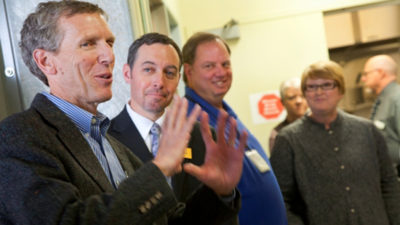UMKC has significantly decreased food waste
When Environmental Protection Agency’s Region 7 Administrator Karl Brooks addressed a crowd in the University of Missouri-Kansas City’s bustling Student Union, he had two basic goals: To congratulate the university on its sustainability efforts, and to project his voice.
After all, it wasn’t the quietest venue, but it was certainly fitting.
At tables not too far from where Brooks spoke, students sat and chatted between classes. They sipped their iced mochas and frappuccinos through compostable straws, and cleaned spills with napkins made from 100 percent recycled materials. When they finished, they tossed their biodegradable cups into one of several composting bins.
On the other side of the Student Union, faculty, staff and students sorted their waste into several bins – a few for composting, a few more for recycling, and others for trash.
It was the ideal backdrop for Brooks’ point: that major institutions – even urban ones like UMKC – can manage waste responsibly. In that sense, UMKC has come a long way. Just a few years ago, the university regularly filled a 20-yard container with waste which went straight to a landfill. Today, roughly 20 percent of the campus’ scraps end up in the trash. The university saves an average of $120,000 a year by not having to pay tipping and hauling fees on the trash.
“UMKC is perfectly positioned to be a leader in this Food Recovery Challenge,” Brooks said.
The EPA’s Food Recovery Challenge invites people to rethink the life cycle of materials. Brooks told the crowd that in 2010 alone, 35 million tons of food waste was generated; 97 percent of that figure was thrown into landfills or incinerators.
The statistics are much brighter for UMKC. Chancellor Leo Morton reminded the crowd that the university’s sustainability efforts add up. Literally.
“Since 2008, UMKC has composted 135 tons of organic materials, made up of food and lawn waste,” Morton said.
But food recovery isn’t limited to the most visible sections of the university’s cafeterias. University Center Director Jody Jeffries led the group through the Student Union’s kitchen, where workers practice composting and recycling.
As Jeffries walked past color-coded compost bins, he admitted to the crowd that initially, he worried that implementing a food recovery program would be difficult. Years later, after working with Sustainability Coordinator Kaye Johnston, Jeffries says that both the education and implementation components have been easy. The savings speaks for itself.
“I hate to make it so simplistic, but it all just fell into place so easily,” Jeffries said.
The tour wrapped up, ironically, near where the 20-yard waste container used to reside. Today, a much smaller container occupies that space.
“Sustainability. You guys are doing it, and you’re doing it successfully,” Brooks said. “This is a model that could be applied to any college, institution or business.”

